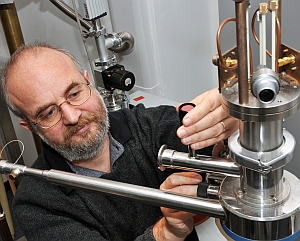A chemistry professor at University of Southampton in the U.K. has received a grant for research on enhanced nuclear magnetic resonance (NMR), a principle underlying magnetic resonance imaging (MRI), widely used in medical diagnostics. Malcolm Levitt and colleagues at Southampton were awarded a four-year, €2.8 million ($US 3.8 million) grant from the European Research Council to support Levitt’s work on lengthening the active time of NMR signals.
NMR is the physical principle underlying MRI scanning, but NMR signals are inherently weak. To overcome this basic weakness, methods have been developed to generate a phenomenon in substances called hyperpolarization that can lead to NMR signals with potentially more than 100,000 times the strength of normal signals.
While the strength of the signal may be boosted, the amount of time an NMR signal of this magnitude lasts is very limited, no more than a minute in the best of cases. Previous research at Southampton, however, has shown the existence of quantum states that have very long lifetimes, in some substances as much as a half-hour.
The new ERC grant will fund a project that combines the hyperpolarization effect to boost NMR signal strength with the long-life quantum states developed in Southampton. The combination could lead to the best case scenario: much stronger NMR signals with the longevity needed to perform MRI scans.
The grant will also fund the acquisition of new equipment for Southampton labs. One new piece will be a polarizer, designed and constructed in Southampton, to generate substances exhibiting the hyperpolarization phenomenon. The second piece of equipment will be a NMR spectrometer equipped to perform small-scale MRI experiments. before conducting live tests on a clinical MRI scanner.
Read More: Mayo Clinic, GE to Research Brain-Scan MRI Technology
* * *


 RSS - Posts
RSS - Posts
You must be logged in to post a comment.